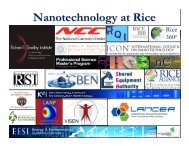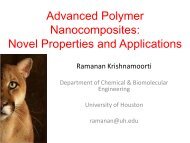Richard E. Smalley Institute for Nanoscale Science and - Center for ...
Richard E. Smalley Institute for Nanoscale Science and - Center for ...
Richard E. Smalley Institute for Nanoscale Science and - Center for ...
You also want an ePaper? Increase the reach of your titles
YUMPU automatically turns print PDFs into web optimized ePapers that Google loves.
John McDevitt<br />
Tomasz Tkaczyk<br />
Rebecca <strong>Richard</strong>s-Kortum<br />
Lon Wilson<br />
14<br />
Diagnostics<br />
Professor McDevitt has developed lab-ona-chip<br />
technology to diagnose <strong>and</strong> treat patients<br />
with HIV/AIDS by determining their<br />
CD4 cell levels quickly at the point of care.<br />
The chip technology replaces a $50,000<br />
dishwasher-sized instrument with a toaster-sized<br />
device that costs about the same<br />
as a digital camera. When CD4 cell testing<br />
is done regularly <strong>and</strong> used to determine<br />
the appropriate therapy, life expectancy in<br />
HIV/AIDS patients can increase by up to<br />
300 percent.<br />
McDevitt <strong>and</strong> his team of researchers at<br />
Rice’s Bio<strong>Science</strong> Research Collaborative<br />
are also using the lab-on-a-chip technology<br />
to process saliva, yielding on-the-spot<br />
results <strong>for</strong> heart attack <strong>and</strong> oral cancer<br />
screening. The nano-bio-chip is currently<br />
being employed at the Michael E.<br />
DeBakey VA Medical <strong>Center</strong> to test <strong>for</strong><br />
heart attack patients. Chest pain brings<br />
about 5 million patients to U.S. emergency<br />
rooms each year, but 80 percent of those<br />
patients are not suffering heart attacks.<br />
The saliva screening <strong>for</strong> heart attacks will<br />
save lives, time <strong>and</strong> money by allowing<br />
doctors to identify those suffering from a<br />
heart attack be<strong>for</strong>e administering a battery<br />
of costly tests.<br />
Assistant Professor Tomasz Tkaczyk <strong>and</strong><br />
Professor <strong>Richard</strong>s-Kortum are also developing<br />
lab-on-a-chip technologies to detect<br />
viral load. These sensors are battery powered,<br />
fit on top of a penny <strong>and</strong> can reduce<br />
the cost of equipment to between $10<br />
<strong>and</strong> $100. These technologies hold promise<br />
<strong>for</strong> meeting the challenge of diagnosing<br />
HIV-infected babies, who require very<br />
expensive tests different from those used<br />
on adults. Specialized HIV tests <strong>for</strong> infants<br />
have the potential to save the lives of<br />
more than 275,000 children each year.<br />
Professor Wilson specializes in the medical<br />
applications of fullerenes <strong>and</strong> ultrashort<br />
carbon nanotubes. When filled with traditional<br />
contrast elements like gadolinium<br />
ions, iron oxide or iodine, the resultant<br />
nano-contrast agent provides as much as<br />
40 times more contrast in MRI <strong>and</strong> X-ray<br />
imaging. The increased contrast provides a<br />
mechanism to detect smaller tumors earlier,<br />
thereby decreasing mortality rates.






